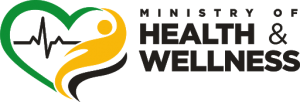The HIV treatment, care and support programme is the technical arm of the national HIV/STI/TB programme, the major goal being to continue management of HIV/STI/TB programmes to ensure universal access to treatment, care and support services. This programme has resulted in a 76% reduction in AIDS-related mortality since the introduction of ARVs in 2004 and vertical transmission of HIV has virtually been eliminated. However there are still some major challenges to be addressed for the scaling up of the response: too few PLHIV being aware of their status, linkage and retention in care being suboptimal, ARV coverage for those eligible is lagging and viral suppression levels are low. STIs are the third most common cause of healthy life years lost by women of reproductive age and Jamaica’s case detection rates for TB over the 25 year period 1990-2014, fluctuated from a high of 79% in 1990 to a low of 48% in 2014.
In order to address these challenges, the following objectives are being highlighted:
- Updating and improving treatment guidelines and capacity building
- Improving accessibility to diagnosis and monitoring of HIV at the point of care
- Improving supply chain management
- Provision of appropriate and accessible services
The clinical management guidelines for HIV have been updated to include the WHO 2013 recommendations.
STI sentinel surveillance is in progress, to be followed by an analysis of the data and recommendations for updating treatment. This will inform the revision and updating of the STI treatment manual.
A technical working group has been formed for the revision of the TB manual. A strategic plan is to be developed, subject to the findings of the PAHO mission/Tb consultancy which is ongoing. Smear microscopy is being reintroduced at the NPHL for TB screening to be followed by the introduction of this service being offered regionally.
Final review of notifications for HIV and congenital syphilis for 2013-2015, continues as we try to close the gaps in the syphilis data, prior to the application for certification of elimination of mother to child transmission of HIV and CS.
The EMTCT guidelines are currently being updated to include the 2013 WHO recommendations. These guidelines will re reviewed and ready for dissemination in 2016.
Capacity building of the team members included training in STI management for Medical officers in every parish to provide information on current clinical management of STIs.
Several training sessions for support staff: social workers, psychologists, adherence counselors has been done over the period to include treatment literacy and readiness, stigma and discrimination, gender based violence, human rights and motivational interviewing. With the help of the EEHR, more training in human rights and positive health, dignity and prevention is planned for the coming year.
HIV testing has been expanded and provider initiated testing and counseling has been reintroduced in all public hospitals, with expansion to outreach sites and primary health care facilities.
Decentralization of CD4 testing is being implemented to improve the accessibility to monitoring tests on an effort to improve viral suppression. Point of care machines are being assigned to treatment sites according to the population served at each site and the demand for tests. A new viral load machine has been commissioned to support viral load testing and allow for scaling up of testing. A study looking at drug resistance in treatment naïve patients is underway, with a limited amount of drug resistance testing being facilitated by the CDC.
Supply chain management continues to be a major function of the TCS unit. Procurement of antiretroviral medication, replacement infant formula and laboratory screening and monitoring supplies continues as per schedule. 10 Private pharmacies have begun dispensing ARVs across the island for a minimal prescription fee.
The All In programme collected data on adolescents 10-19, and is now using this data to prioritize the needs of adolescents living with HIV. The NHP is part of a multidisciplinary group leading this mission.
Testing
Downloads
Social Support Medical Services
MOH PharmWatch drug Monitoring form 2009
